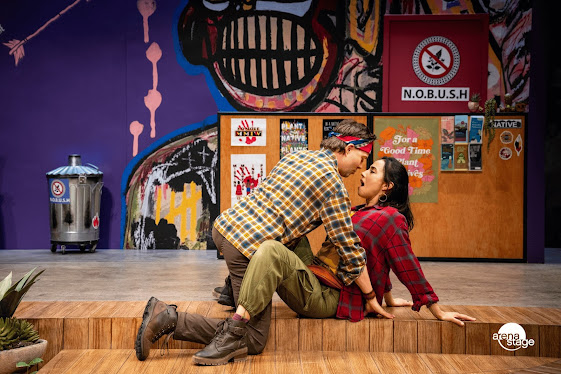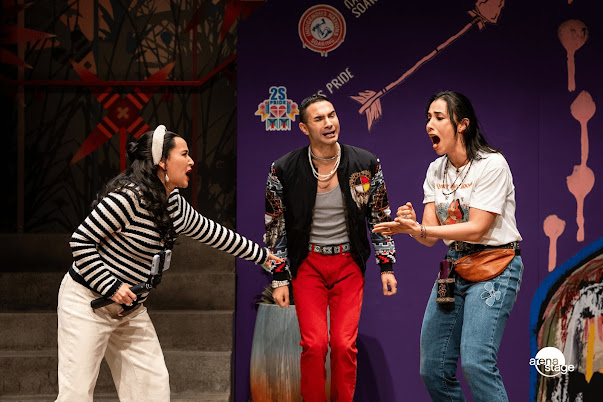Fake It Until You Make It, Kreeger Theatre, Arena Stage, Washington, DC
Amy Brenneman as River in Fake It Until You Make It by Larissa FastHorse at Arena Stage. Photo credit: Daniel Rader.
I believe that two of the most challenging forms of theatre are farce and satire. I recall a definition of farce as events that are theoretically possible but far from probable, and to a certain extent, the more outrageous, the better. Satire requires the examination of an idea of significance and demonstrating that the idea is not nearly as significant (or sacred) as it is supposed to be. Combining both farce and satire in a play about personal identity in a political environment where the value and validity of exploring (and celebrating) the differences between us are under attack, in the nation’s capital, is gutsy. And that is exactly what is happening at the Kreeger Theatre stage at Arena Stage in a co-production with Center Theatre Group of Los Angeles, where it premiered earlier this year. This is the kind of theatre that DC audiences relish.
Larissa FastHorse, the first Indigenous playwright to have a
play on Broadway, has concocted Fake It Until You Make It, a play about
two non-profit organizations competing against each other for precious grant
money – the lifeblood of those groups. The two groups are led by strong-willed
women: Wynona is proudly Indigenous, committed to her community to the extent
that she rules out marrying her current boyfriend, Theo, because he is White
and therefore cannot give her Indigenous children; and River, a White woman, who
presents herself as an “ally,” though her sincerity is sometimes in question.
On one hand, of all of the charities with which she could be affiliated, she
has chosen one benefitting Indigenous people, but there is an air of “White
Savior” about her: not recognizing her own privilege while using it.
Noah Bean as Theo and Shyla Lefner as Wynona in Fake It Until You Make It. Photo credit: Daniel Rader.
Also in the mix are Krys, an Indigenous gay man working with
his own group, who appears to be something of a protégé to Wynona; Grace, who
appears to be a lawyer working with Wynona’s group; and Mark, an applicant for
an internship with River’s group.
Elements of farce abound as we can tell from our first
vision of the production’s basic set: there are doors to be slammed, barriers
to hide behind, and a staircase that invites pratfalls. Into this atmosphere,
Playwright Fasthorse introduces characters pretending to be persons other than who
they are, the unexpected arrival of a new character whose presence completely
changes the dynamic between the characters, and an ill-mannered cat, who
practically becomes a character and whose presence ignites conflicts among the
characters.
Because it is farce, all is resolved by the end of the play.
There is the revelation by DNA results that some of the identities the
characters have claimed, indeed, some of their core characteristics, are wrong,
which causes reversal in some of the characters’ relationship dynamics. Because
it is satire, the play takes aim at preconceptions about race and other social
aspects of identity: one character even goes so far as to consider the option
of (and practicing) “race shifting.”
Burgandi Trejo Phoenix as Grace, Brandon Delsid as Krysm Eric Stanton Betts as Mark, Noah Bean as Theo, and Shyla Lefner as Wynona in Fake It Until You Make It. Photo credit: Daniel Rader.
Amy Brenneman, best known for her Emmy-nominated television series
roles in “NYPD Blue” and “Judging Amy,” is the marquee name in the production as
White do-gooder River, but this is very much an ensemble piece in which each
performer excels. Brenneman projects a poised-but-frustrated air as she opens
the performance with a pratfall, busily rearranging plants on the stage. She
meets her match in Shyla Lefner as Wynona, fiercely convicted to protecting the
environment (for the butterflies, which she claims are as essential to the
eco-system as bees) and defiantly proud of her status as an Indigenous woman.
Lefner’s Wynona is playful and physically flirtatious with boyfriend Theo,
played by Noah Bean. Bean has mastered the exaggerated emotion of the farce,
deftly handling the physical comedy the role requires. Brandon Delsid as Krys
delivers sass and biting sarcasm with flair, as well as his own flirtatiousness
when needed. Eric Stanton Betts’s portrayal of Mark takes us on some unexpected
twists. Mark functions as something of a “straight man” (in a farcical context).
Burgandi Trejo Phoenix as Grace milks the comedy from her numerous entrances
and exits.
Burgandi Trejo Phoenix as Grace, Brandon Delsig as Krys, and Shyla Lefner as Wynona in Fake It Until You Make It. Photo credit: Daniel Rader.
Director Michael John Garcés keeps the action moving, ably assisted by fight director Edgar Landa, ensuring that the cast manages some intricate and very funny moves. Balancing the farcical elements withsatire, Garcés appears to focus more on the former. As usual, Arena’s technical production is first-rate. Sara Ryung Clement’s set design provides a playground for the cast as they engage in the action, decorated by the work of a number of Indigenous artists, as well as set pieces representing adjoining offices for the two groups. Costumes by E. B. Brooks place us firmly in the present, incorporating Indigenous patterns and materials using bold colors in the designs. Lighting design by Tom Ontiveros and sound design by John Nobori are seamlessly functional.
One day, I fear we may see Fake It Until You Make It
as a quaint period piece from a time when diversity, equity, and inclusion were
not “dirty words.” I hope, though, that we as a nation will return to honoring
those characteristics and celebrating all of the disparate elements of our culture.
In the meantime, I will be interested to see how subsequent productions will
fare. For now, the production continues at Arena Stage through May 4.








Comments
Post a Comment